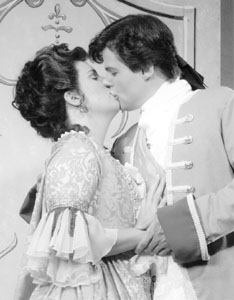![[Metroactive Stage]](/stage/gifs/stage468.gif)
[ Stage Index | Silicon Valley | Metroactive Home | Archives ]
 Wager of Love Kirk Eichelberger and Julie Makerov pair up in Mozart's 'Cosi fan tutte.'
Wager of Love Kirk Eichelberger and Julie Makerov pair up in Mozart's 'Cosi fan tutte.'
Photograph by Pat Kirk
Ask Cleve 'Cosi fan tutte' masks the mirth in Mozart By Michael J. Vaughn WITH OPERA SAN JOSE'S Cosi fan tutte the music fought the comedy, and the comedy lost. So did the audience. At first, the pairing of conductor George Cleve and stage director Michael Edwards seemed like an opera-lover's dream come true. As the founder of San Francisco's Midsummer Mozart Festival (and former director of the San Jose Symphony), Cleve has likely memorized the entire catalog by now, and he is a passionate, demanding conductor. Edwards made his name as the iconoclastic artistic director of Shakespeare Santa Cruz, then went on to direct operas all over the globe, including The Barber of Seville at the Met. Problem is: Edwards' energetic, often provocative approach to theater is nowhere to be found. He's either had some kind of wild artistic conversion or had his hands tied by, oh, I don't know--a purist conductor? Either way, this is the driest Cosi I've ever witnessed. Mozart's comedies provide two primary delights: incredibly beautiful vocal music, and spirited, irreverent stage play. It's fine to take the conservative, musical approach--provided you have the voices to pull it off. Opera San Jose doesn't. Let's start with the sopranos (the show is double cast): Julie Makerov and Michele Detwiler, as the two tempted lover girls Fiordiligi and Dorabella. Both possess a distinctly non-Mozartean heaviness in their voices and lack separation in their phrases. The biggest letdown came in Fiordiligi's infamous roller-coaster aria, "Come scoglio," in which we discovered that Makerov's heavy tone did not necessarily translate to a good lower range. (The pleasant surprise is that Makerov and Detwiler blend very well, notably in the trio with Don Alfonso, "Soave sia il vento.") On the male side, Ferrando and Guglielmo make a bet on their girls' fidelities, then dress up as mustachioed Albanians to tempt them directly. Here we find a winner with bass Kirk Eichelberger (Guglielmo), but tenor Jonathan Hodel proves to be a tonal wanderer, especially in Ferrando's farewell aria, "Una bella serenata." The best voices belong to the comics, beginning with Don Alfonso, the maker of the bet ("A faithful woman is like a phoenix," he says. "All believe in it but none has seen it."). Scott Bearden delivers the part in his usual perfect, self-assured manner. There's also underexploited talent among the less-than-spectacular singers. Hodel performs a fine somersaulting pratfall, and Detwiler accents Dorabella's frisky, overeager nature with a repertoire of adorable and amusing gestures. Need it be said that, in a comic opera, these tools are just as valuable as a solid top note or a smooth portamento? But no, wouldn't want to despoil Mozart's genius with actual entertainment, wouldn't want to be caught tap-dancing in the museum. About the only innovation I could positively link with Edwards was the end-of-scene forays to stage front, which allowed efficient switches of Paul Manchester's agile sets while the characters finished up their musical business. Next time, let's just do a concert version and send Edwards someplace he can actually apply his talents.
Cosi fan tutte plays Nov. 24, 27, 29-30 and Dec. 1 at 8pm, and Nov. 25 and Dec. 2 at 3pm, at Montgomery Theater, San Carlos and Market streets, San Jose. Tickets are $40-$56. (408.437.4450 or operasj.org) [ Silicon Valley | Metroactive Central | Archives ]
|
From the November 22-28, 2001 issue of Metro, Silicon Valley's Weekly Newspaper.
Copyright © 2001 Metro Publishing Inc. Metroactive is affiliated with the Boulevards Network.
For more information about the San Jose/Silicon Valley area, visit sanjose.com.